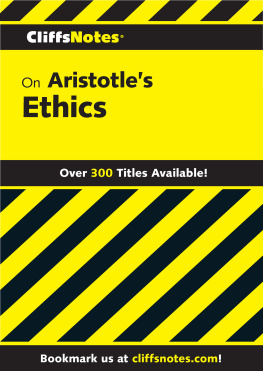Copyright 2004 Houghton Mifflin Harcourt Publishing Company
All rights reserved.
www.hmhco.com
For information about permission to reproduce selections from this book, write to Permissions, Houghton Mifflin Harcourt Publishing Company, 215 Park Avenue South, New York, New York 10003.
The publisher and the author make no representations or warranties with respect to the accuracy or completeness of the contents of this work and specifically disclaim all warranties, including without limitation warranties of fitness for a particular purpose. No warranty may be created or extended by sales or promotional materials. The advice and strategies contained herein may not be suitable for every situation. This work is sold with the understanding that the publisher is not engaged in rendering legal, accounting, or other professional services. If professional assistance is required, the services of a competent professional person should be sought. Neither the publisher nor the author shall be liable for damages arising herefrom. The fact that an organization or website is referred to in this work as a citation and/or a potential source of further information does not mean that the author or the publisher endorses the information the organization or website may provide or recommendations it may make. Further, readers should be aware that Internet websites listed in this work may have changed or disappeared between when this work was written and when it is read.
Trademarks: CliffsNotes, the CliffsNotes logo, Cliffs, cliffsnotes.com, and all related trademarks, logos, and trade dress are trademarks or registered trademarks of Houghton Mifflin Harcourt Publishing Company. All other trademarks are the property of their respective owners. Houghton Mifflin Harcourt is not associated with any product or vendor mentioned in this book.
eISBN 978-0-544-17966-0
v1.0615
About Aristotles Ethics
Introduction
The Nicomachean Ethics, Aristotles most important study of personal morality and the ends of human life, has for many centuries been a widely-read and influential book. Though written more than 2,000 years ago, it offers the modern reader many valuable insights into human needs and conduct. Among its most outstanding features are Aristotles insistence that there are no known absolute moral standards and that any ethical theory must be based in part on an understanding of psychology and firmly grounded in the realities of human nature and daily life. In addition, the book vividly reflects Aristotles achievements in other areas of philosophy and is a good example of his analytical method, which must be considered the ultimate basis of all modern scientific research.
People have not changed significantly in the many years since Aristotle first lectured on ethics at the Lyceum in Athens. The human types and problems he discusses are familiar to everyone. The rules of conduct and explanations of virtue and goodness that he proposes can all help modern man to attain a fuller and more satisying understanding of his responsibilities as a member of society and the purpose of his existence. For this alone Aristotles book is still worth reading.
Main Points of Aristotles Ethical Philosophy
The highest good and the end toward which all human activity is directed is happiness, which can be defined as continuous contemplation of eternal and universal truth.
One attains happiness by a virtuous life and the development of reason and the faculty of theoretical wisdom. For this one requires sufficient external goods to ensure health, leisure, and the opportunity for virtuous action.
Moral virtue is a relative mean between extremes of excess and deficiency, and in general the moral life is one of moderation in all things except virtue. No human appetite or desire is bad if it is controlled by reason according to a moral principle. Moral virtue is acquired by a combination of knowledge, habituation, and self-discipline.
Virtuous acts require conscious choice and moral purpose or motivation. Man has personal moral responsibility for his actions.
Moral virtue cannot be achieved abstractlyit requires moral action in a social environment. Ethics and politics are closely related, for politics is the science of creating a society in which men can live the good life and develop their full potential.
Subjects Covered in The Nicomachean Ethics
Book I, Chap. 13: Nature of Ethics and methods of studying Ethics.
Book I, Chap. 412: Discussion of Happiness and the good as the ends of human life.
Book II, Chap. 14: Discussion of Moral Virtue.
Book II, Chap. 59: The Doctrine of the Mean.
Book III, Chap. 15: Moral purpose and moral responsibility.
Book III, Chap. 612, and Book IV: Discussion of particular moral virtues.
Book V: Discussion of Justice.
Book VI: The Intellectual Virtues.
Book VII: Continence and Incontinence.
Books VIII and IX: Friendship.
Book X, Chap. 15: Further discussion of Pleasure.
Book X, Chap. 68: Happiness, the end of human life.
Book X, Chap. 9: Relationship of Ethics and Politics.
SUMMARY AND ANALYSIS
Book I: Chapter I
The Aim of All Action Is the Good
Summary
All human actions and choices aim at some good, which may be defined as the end or object of that action or choice. There are as many kinds of ends as there are kinds of activity and the ends may vary, depending on the particular activity being studied (e.g., the end of medical science is good health, the end of military science is victory). Some ends are subordinate to other ends, because the latter provide the motive for pursuing the former (e.g., the activity of bridle-making is subordinate to the more important activity of horsemanship, which is in turn subordinate to the activity of military science). The major ends for the sake of which minor ends are pursued are superior and ought to be preferred.
Book I: Chapter II
Politics Is the Study of the Good
Summary
If there should exist an end which is desirable for its own sake, which determines and motivates all other actions and choices, this end would be that which is absolutely good. Knowledge of this good would be of great value, for it would provide an aim for life and a standard by which to evaluate all other activities and thoughts.
Politics, the most comprehensive of the practical sciences, is the field of knowledge to which the study of this good belongs. It is the aim of politics to create the best possible conditions in which citizens can lead good lives. This can only be achieved by a knowledge of the good. Thus, the end of politics is human good. The study of ethics, which shares this aim, is a branch of politics.
It is possible that the good of the community and the good of the individual are identical, but even so the good of the community is a greater and more perfect moral goal toward which to work. To achieve the good of the individual is worthwhile, but the good of the community, which is composed of many individuals, has a higher, more divine quality.
Book I: Chapter III
Limitations on the Study of Politics and Ethics
Summary
The degree of precision and certainty that can be sought in the study of any subject is dependent on the nature of the particular subject. Some subjects allow more precision in the conclusions to be drawn than do other subjects. The questions of what is noble and what is just (the subjects of politics and ethics) present a good deal of varied opinion and divergence of opinion, and there is a similar fluctuation in discussions on the nature of the good.
Next page








